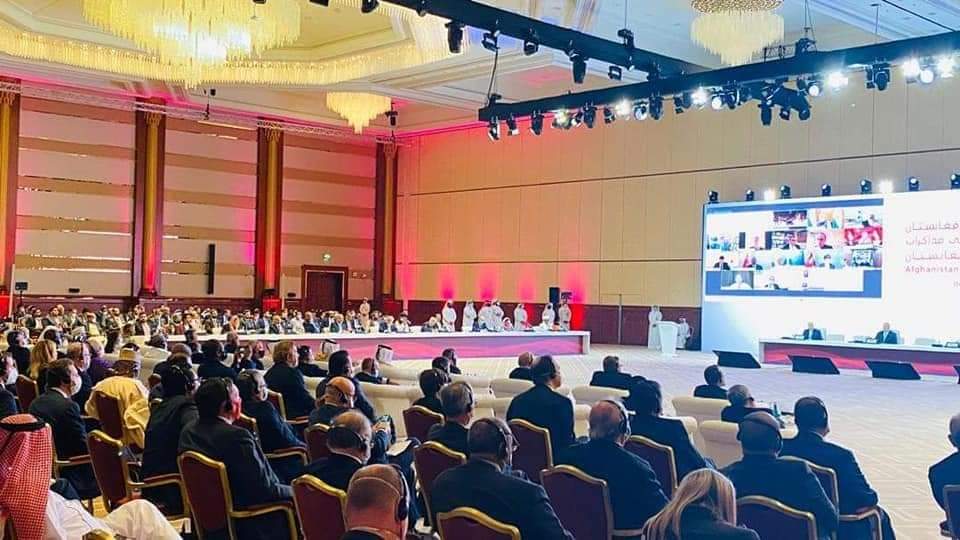The New Yorker Magazine in a lengthy report with newly available source material shed light on the Afghan peace process–from its start in 2010 to the foreign forces’ withdrawal in August of this year. Titled, “The Secret History of the US Diplomatic Failure in Afghanistan,” the report is the first of two parts and covers the failure of the peace process and the fall of Kabul, and is written by Steve Coll and Adam Entous.
According to the New Yorker report, the first attempts for making peace between the Taliban and Afghan government started in November 2010. However, the attempts did not materialize because the Taliban refused to work with the then-president Hamid Karzai government, seeing him as “an illegitimate puppet.”
On the other hand, Karzai also objected to the US conferring legitimacy to the Taliban. “You betrayed me!” Karzai shouted at Ryan Crocker, the US Ambassador to Afghanistan, during a meeting in late 2011.
According to the New Yorker, the peace talks did not bear fruits for many years because the Taliban objected to talking with the Afghan government, instead insisting for direct talks with the United States.
The peace talks got serious during Donald Trump’s administration because the US president was determined to pull out US soldiers from Afghanistan, the report says.
Throughout the negotiations between the Taliban and the Trump Administration, Ashraf Ghani and his government were sidelined.
To have leverage, Ghani maintained back channels to American politicians who were supportive of the war, the report says. Ghani, for instance, maintained ties with Republican Senator Lindsey Graham, who was advocating for the US’s presence in Afghanistan.
Many US officials believed that Ghani had no interest in peace talks. “He preferred the status quo,” Khalilzad said. “It kept him in power.”
According to the New Yorker, Trump even had asked Zalmay Khalilzad, the then US envoy for Afghan peace, to provide the Taliban with money if that would encourage them to have a peace deal.
Trump asked Khalilzad if he could give the Taliban “something to make them cooperate.”
“What are you talking about, Mr. President?”
“Like money.”
“No,” Khalilzad replied. “They’re on a terrorism list. We can’t give them money.”
Finally, the US and the Taliban drafted a deal which was signed in February 2020. When Khalilzad told Trump that Ghani was not happy with the draft deal, Trump replied: “Why are you wasting your time going to talk to Ghani? He’s a crook.”
When on July 2021 Ghani met President Joe Biden in Washington, Shaharzad Akbar, the chairwoman of the Afghanistan Independent Human Rights Commission (AIHRC) was also in Washington, meeting with human rights groups. The report quoted her saying she was disappointed about peace when she heard that many Americans had already concluded that Afghanistan was a lost cause. “I ended up crying a lot that evening,” Akbar said. She returned to Kabul and went from embassy to embassy requesting visas for her staff.
According to the New Yorker, Ghani asked for military assistance from Biden, such as more helicopters, and the continuation of logistical support by the American contractions. Biden’s response was vague, according to Afghan officials present in the room.
The New Yorker touched upon the release of Taliban prisoners, quoting American officials saying that Khalilzad wanted a deal to be signed and that he was ready to gives almost everything to the Taliban.
Khalilzad “plainly wanted a deal and seemed willing to give the Taliban almost everything,” said Andru Wall, a Navy commander at the Resolute Support Mission. “It was not clear if we had any true red lines.”
According to the report, the then US Secretary of State Mike Pompeo in a meeting with Ghani in Kabul urged him to be flexible about releasing the Taliban’s prisoners and assured him that “The United States is your leverage. If we do not get what we want, we will not leave,” he said. “We will only leave when there is a political resolution.”
“This clarity that you will stand with us in the negotiation is something that we have never had,” Ghani told him, according to the report.
The New Yorker said the Taliban had agreed on terms over counterterrorism and restrictions on fighting, especially stopping Taliban fighters from attacking US and NATO troops as they withdraw based on the agreement. “If one American dies after the deal is signed, then the deal is off,” Miller told the Taliban envoys before the Doha deal.
Based on the Doha deal, the intra-Afghan peace talks was scheduled for March 10, 2020, to seek an enduring peace in Afghanistan. The talks, however, started six months later than the date specified in the deal.
Abdul Matin Bek, an advisor to Ghani and a member of the republic negotiation team, had told Khalilzad that the Taliban were not willing to make a political settlement. He told Khalilzad “wake up.” “Please, for God’s sake, the Taliban are not in favor of negotiations, they are not in favor of a political settlement,” he said. “They’re really on a victory march,” the report said.
The talks did not bear fruit, while at the same time war intensified in the country, which according to Miller was clearly “violations in spirit, if not the written word” of the Doha deal.
The intra-Afghan talks did not lead to peace and the Taliban continued overrunning provinces. Kabul finally fell on August 15th, 2021.
According to the report, on August 14, a day before Kabul’s fall, Hamdullah Mohib, the national security adviser, had learned that one of his colleagues at the Presidential Palace was on a list of at-risk Afghans approved by the US embassy for evacuation. “That afternoon, Mohib spoke by phone with a contact at the State Department. During a discussion about peace talks, Mohib paused to ask, “Is there an evacuation plan for us, for me and Ghani? The official asked for something in writing.”













